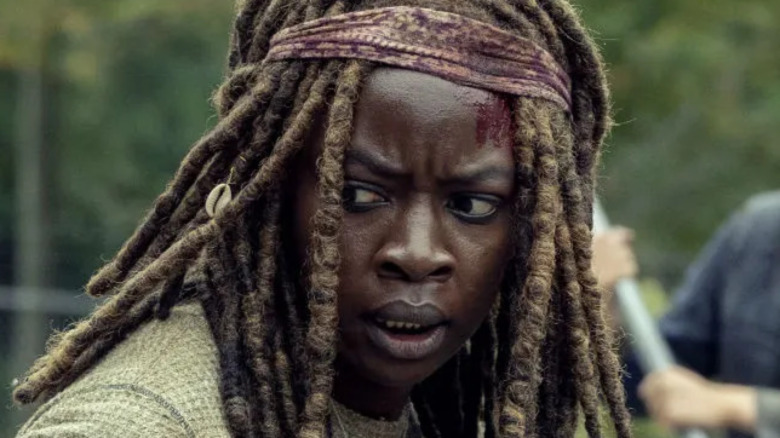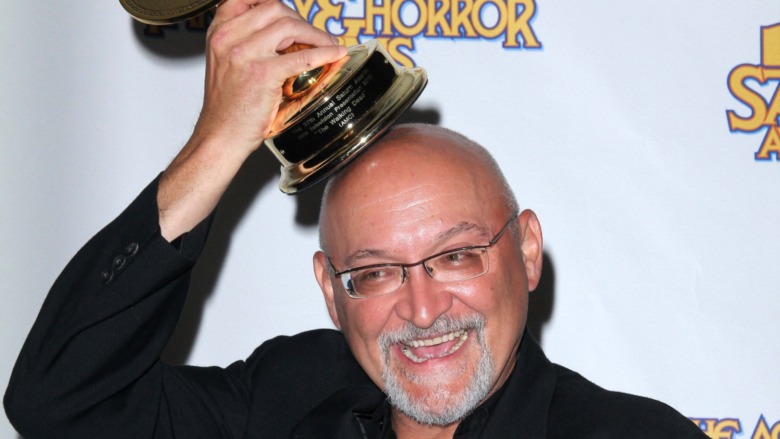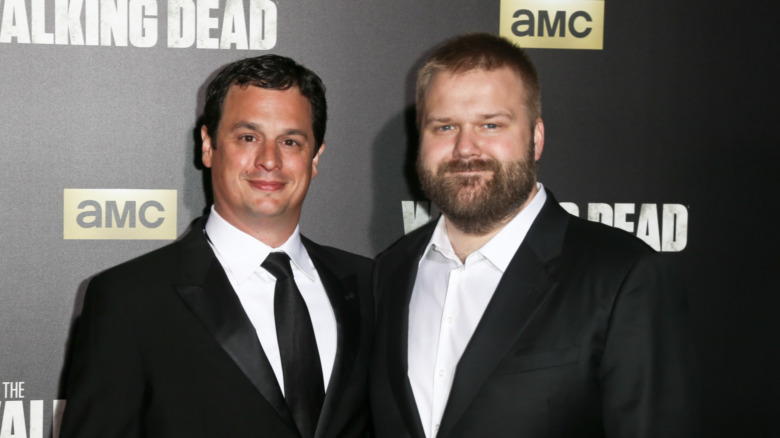Everything You Need To Know About The Walking Dead Lawsuit
The results of the "The Walking Dead" lawsuit not only affect the future of the zombie apocalypse drama, but they will change how the entire entertainment industry negotiates contracts. The trouble began all the way back in 2010, when "The Walking Dead" was in its first season, and AMC was just beginning to develop their own content. As is customary, the creatives (writers, producers, actors) signed contracts negotiated between AMC and their agents that entitled the talent and their representatives to a portion of net proceeds (typically by way of a calculation called Modified Adjusted Gross Receipts — or MAGR).
At the time, Netflix ruled the streaming seas, and it wasn't common for a network to have their own streaming service, so it was difficult for reps to accurately phrase these clauses in a way that contemplated all potential future avenues for exploitation. Frank Darabont, the co-creator of "The Walking Dead" show, and his legal counsel thought they had prepared for every possible future exploitation of their creative work by placing certain stipulations and catch-alls in their contracts, but entertainment law can be tricky, and AMC found a workaround that left Darabont, Creative Artists Agency, and the series' other producers on the outside of a few big piles of money.
Here's the nitty gritty on the rest of "The Walking Dead" lawsuit.
Why is Frank Darabont suing?
Per The Hollywood Reporter, Darabont and his talent agency, CAA ,filed a lawsuit in December of 2013 against "The Walking Dead" network AMC. The lawsuit came swiftly after AMC fired Darabont in the show's second season.
Darabont and CAA are claiming $280 million in damages for what they call "denial of profit participation" (via The Hollywood Reporter). The plaintiff (Darabont) argues that AMC, for lack of a better word, fudged the numbers when it came to the show's actual net profits. The outlet gave the example of a profits statement for March 2014 that stated the show had made $159 million in total gross receipts, but after distribution, licensing, and production costs had spent $184 million, putting them at $24 million deficit. Darabont and CAA allege that the numbers are questionable, since AMC is implementing its own accounting and fee structure for its in-house streaming service, which didn't even exist at the time Darabont's contract was negotiated. Much consternation revolves around the "imputed fee" clause AMC has in its talent contracts, which allows AMC to use a type of "best guess" calculation of what each episode is worth. Darabont says this calculation isn't valid; AMC says it is, and that if Darabont and CAA weren't satisfied with the language, they shouldn't have signed the agreement.
In essence, Darabont is arguing that AMC lined their pockets, while misrespensenting how successful the show was in order to pay him (and others) less money. AMC argues that Darabont is trying to gain what he couldn't negotiate in his initial contract.
Who else is involved?
The creator of "The Walking Dead" comics, Robert Kirkman, also sued AMC in 2017 in a case similar to Darabont's (via The Wrap). Whereas Darabont filed in New York, Kirkman filed his suit in California. Named as additional plaintiffs with Kirkman were "TWD" producers Glen Mazzara, David Alpert, Charlie Eglee and Gale Anne Hurd, all of whom argued that AMC breached their respective contracts. The producers posited that AMC should have to pay "fair market" value to stream "The Walking Dead" on their own streaming site, which would, in turn, affect how much they receive via their contracts. They also asked for the judge to consider whether the plaintiffs were owed profits from spin-offs "Fear The Walking Dead" and "The Walking Dead: The World Beyond."
On July 22 2020, The Hollywood Reporter wrote that a judge had ruled in favor of AMC in Kirkman's case. The company's attorney, Orin Snyder, spoke to the press about AMC's win. "Today's decision is a total victory for AMC, the judge found in AMC's favor on all seven issues that were presented at trial and confirmed that AMC honored its contracts and paid Kirkman and the other plaintiffs what they were owed."
Snyder went on to say that AMC would now turn their attention toward Darabont's suit in New York, and theorized that the California decision will likely affect the New York ruling.
So what's next?
The New York trial has yet to begin, and AMC is using the time for damage control. THR reported that In 2017, AMC came to a new agreement with "TWD" producer Greg Nicotero, which entitles him (and in turn everyone else with a contract) to an improved license fee.
Also complicating matters is a juicy bit about Darabont's profane emails. As reported by Deadline, AMC entered into evidence a series of explicit emails Darabont sent to staff while he was engaged on Season 1 and 2. Darabont's lawyers argue that the email dumps are not "remotely relevant [to the case]" and are an attempt at a distraction for the judge and jury.
Profit re-negotiations in Hollywood are common, and "The Walking Dead" lawsuit is one of many recent court cases related to how networks compensate talent in the world of streaming. Just last week, the WGA West settled a similar case with CBS, per Deadline. All of Hollywood will be looking to the judge's decision in "The Walking Dead" case as a framework for further negotiations, as the subject is bound to come up again.
If Jack Donaghy had a say, he would sing the praises of the networks' vertical integration strategy, something Darabont, in his affidavit, calls wholesale "corporate greed."



